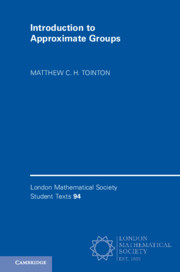Book contents
- Frontmatter
- Dedication
- Contents
- Preface
- 1 Introduction
- 2 Basic Concepts
- 3 Coset Progressions and Bohr Sets
- 4 Small Doubling in Abelian Groups
- 5 Nilpotent Groups, Commutators and Nilprogressions
- 6 Nilpotent Approximate Groups
- 7 Arbitrary Approximate Groups
- 8 Residually Nilpotent Approximate Groups
- 9 Soluble Approximate Subgroups of GLn(C)
- 10 Arbitrary Approximate Subgroups of GLn(C)
- 11 Applications to Growth in Groups
- References
- Index
5 - Nilpotent Groups, Commutators and Nilprogressions
Published online by Cambridge University Press: 31 October 2019
- Frontmatter
- Dedication
- Contents
- Preface
- 1 Introduction
- 2 Basic Concepts
- 3 Coset Progressions and Bohr Sets
- 4 Small Doubling in Abelian Groups
- 5 Nilpotent Groups, Commutators and Nilprogressions
- 6 Nilpotent Approximate Groups
- 7 Arbitrary Approximate Groups
- 8 Residually Nilpotent Approximate Groups
- 9 Soluble Approximate Subgroups of GLn(C)
- 10 Arbitrary Approximate Subgroups of GLn(C)
- 11 Applications to Growth in Groups
- References
- Index
Summary
We introduce nilpotent groups, define nilprogressions and nilpotent progressions, and present some of their basic properties. We start by introducing the Heisenberg group. We present some specific examples of nilprogressions and nilpotent progressions in the Heisenberg group and show that they have small tripling. We then define general nilpotent groups and present their basic properties. Next, we introduce commutators, the collecting process and basic commutators. Finally, we define nilprogressions and nilpotent progressions in general, show that they have small tripling and show that the notions of nilprogression and nilpotent progression are roughly equivalent.
Keywords
Information
- Type
- Chapter
- Information
- Introduction to Approximate Groups , pp. 81 - 108Publisher: Cambridge University PressPrint publication year: 2019
